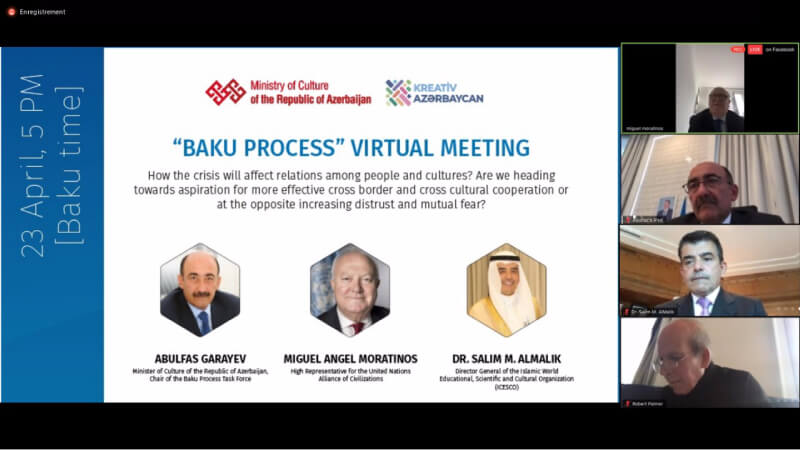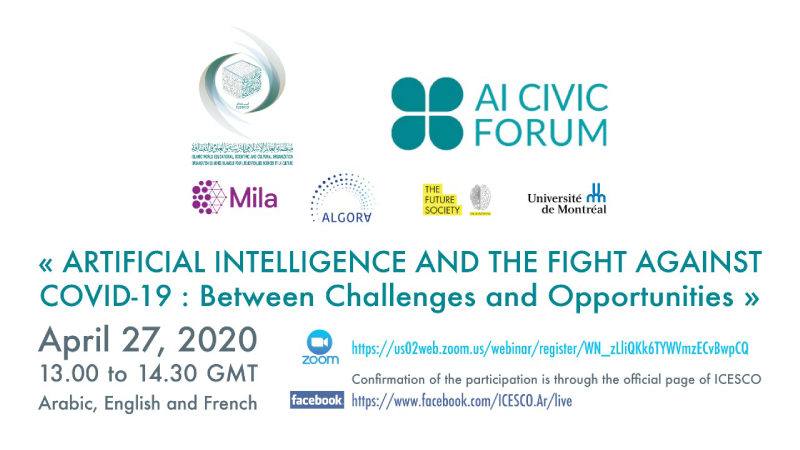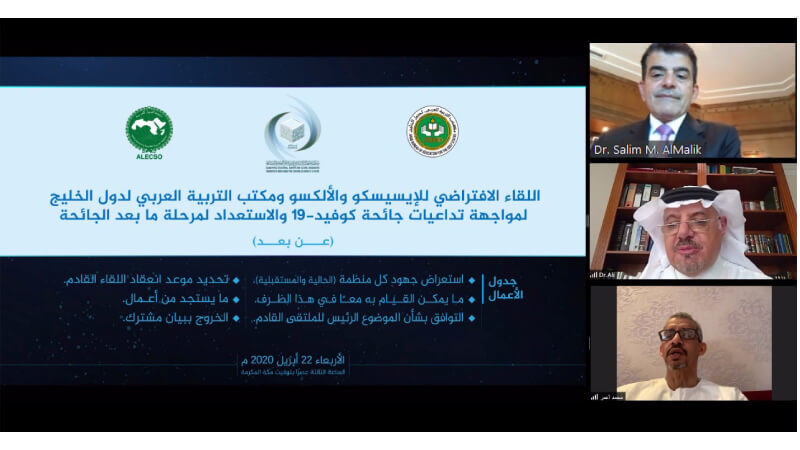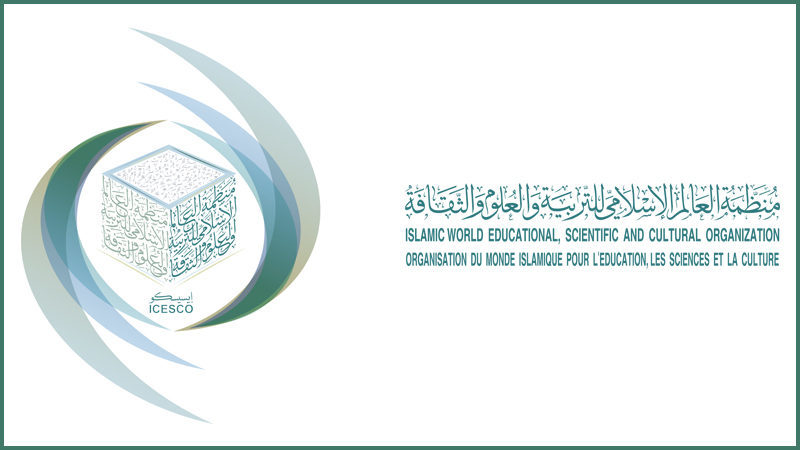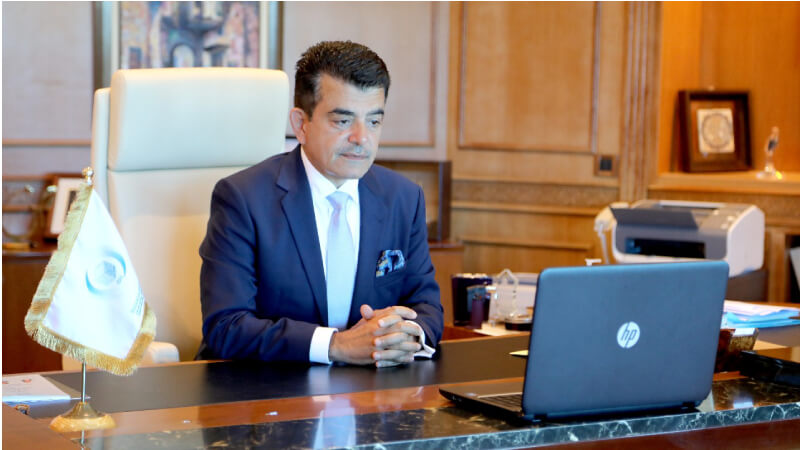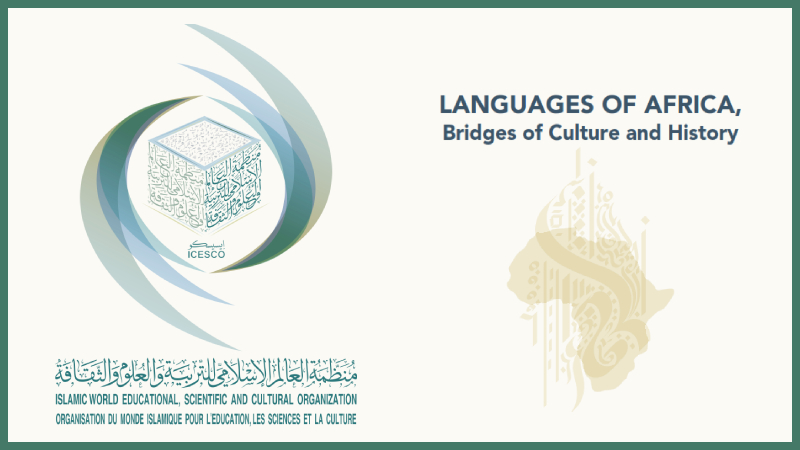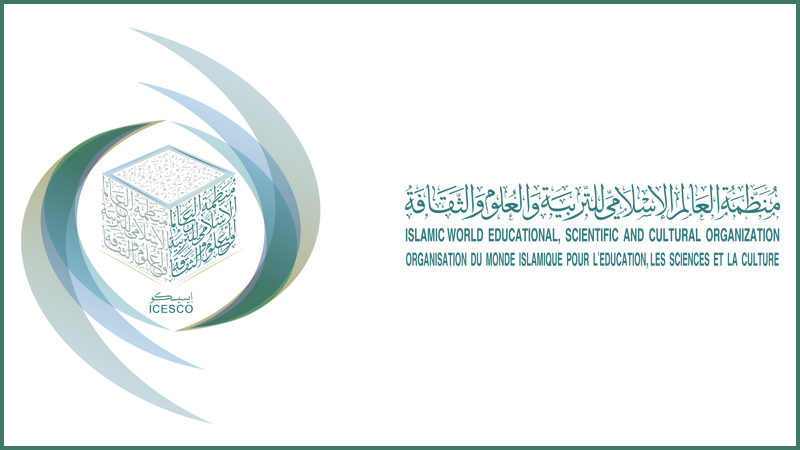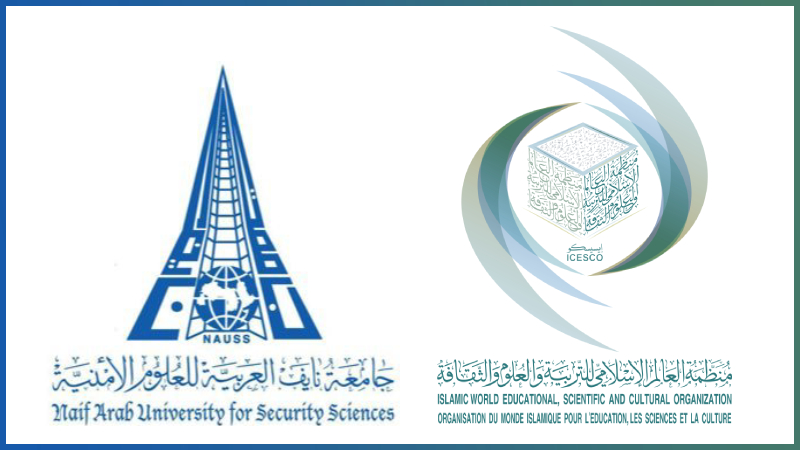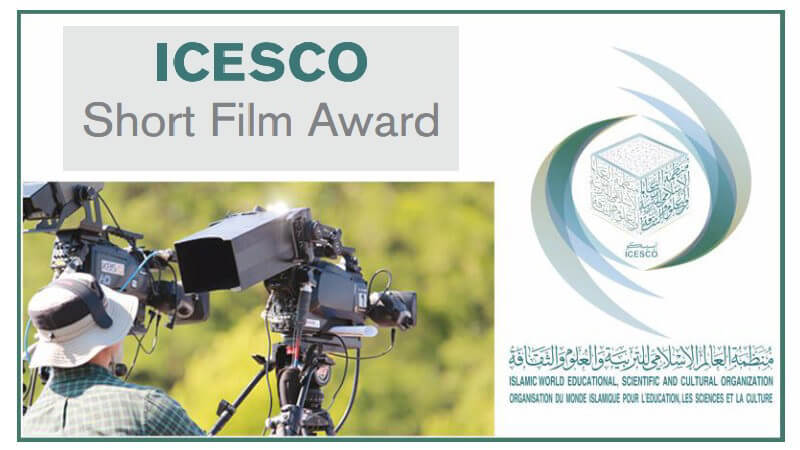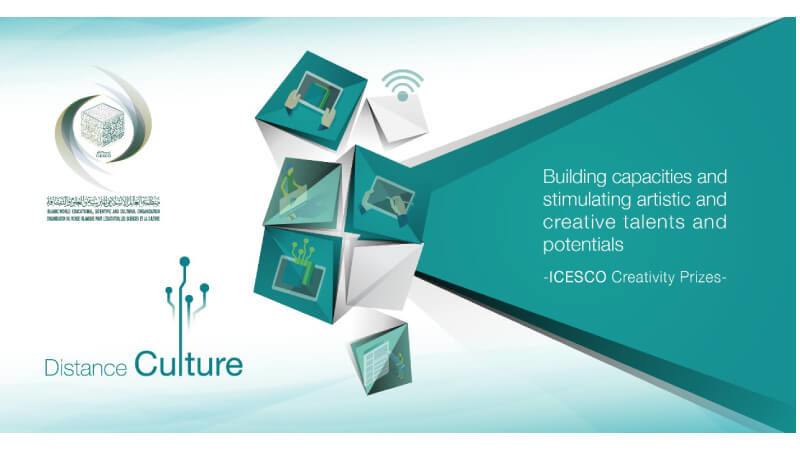Dr. Salim M. AlMalik, Director General of the Islamic World Educational, Scientific and Cultural Organization (ICESCO) said that “health epidemics, natural, and environmental disasters facing humanity today could be an opportunity to look seriously on the threats posed by the human activities on the planet. Our destructive environmental footprints directly or indirectly affect biodiversity and the sustainability of life on earth. We should begin to reflect and envision a model for an alternative society wherein ethics, people, and the environment are at the heart of the issues.”
This statement was part of ICESCO Director General’s address at the virtual meeting on the impact of crises on relations among people and cultures, organized by the Ministry of Culture of the Republic of Azerbaijan within the framework of the Baku Process for Intercultural Dialogue. The meeting was attended by Mr. Abulfas Garayev, Minister of Culture of the Republic of Azerbaijan, Mr. Miguel Moratinos, High Representative of the United Nations Alliance of Civilizations, and several experts specialized in dialogue among civilizations and human and social sciences.
In his address, Dr. AlMalik emphasized that the current model based on utilitarianism and dominated by globalization is on the brink of collapse, giving way to a reconsideration of future and sustainable transformations drawing on the indicators of cultural change of each geographical region. Changes must be made in consideration of the local context and principles: “Think Globally and Act Locally.” From this perspective, communities, including the Islamic world communities, are allowed to consider themselves as a participating entity rather than an excluded and marginalized group. A self-supporting community can be independent and efficient in the long run and in various fields.
Dr. Al Malik then stated that ICESCO had launched a comprehensive humanitarian initiative titled “Comprehensive Humanitarian Coalition,” international to face the adverse effects of the coronavirus pandemic Covid-19, both on the regional and levels.
At the close of his address, ICESCO’s Director General suggested several working mechanisms to promote cultural interaction, among which includes:
-Setting up an observatory for cultural trends.
-Strategic monitoring of best practices and performance measurements.
-Creating a sustainable future lab to support the strategic decision-making process.
-Conducting foresight research and studies supported by reports that help in planning and decision-making.
-Setting up a forum for ideas through the organization of seminars, round tables, and participatory workshops.
-Supporting strategic decision based on a forward-looking approach.
It is worth recalling that the Baku Process is an initiative launched by Mr. Ilham Aliev, President of the Republic of Azerbaijan to promote a productive dialogue among civilizations and cultures. The Baku Declaration was issued in 2008.
Category: News update
News
ICESCO Virtual Forum to discuss “Artificial Intelligence and the Fight Against Covid-19: Between Challenges and Opportunities”
The Islamic World Educational, Scientific and Cultural Organization (ICESCO), in partnership with the AI Civic Forum, will organize a webinar on the theme “Artificial Intelligence and the Fight against Covid-19: Between Challenges and Opportunities”, on Monday 27 April 2020 at 13.00 GMT.

The webinar will be attended from ICESCO by Dr. Salim M. AlMalik, ICESCO Director General; Dr. Kais Hammami, Strategic Futurist, Director of the Center for Strategic Foresight. It will also bring together Ms. Irina Rish, Associate Professor in the Computer Science and Operations Research Department at the Montreal University, core member of MILA – Quebec AI Institute; Mr. Cyrus Hodes, Chair of the AI Initiative at the Future Society, former Advisor to the Minister of AI of the United Arab Emirates; Mr. Emad Mostaque, founder of Stability AI, Symmitree and Ananas, three projects using applied epistemology and complex adaptive systems to help address global issues; and Mr. Marc-Antoine Dilhac, Professor of Philosophy at the University of Montreal and Initiator of the Montreal Declaration for the Responsible Development of AI.
The webinar also features presentations from Mr. Nicolas Miailhe, Co-Founder and President of The Future Society, a nonprofit organization specializing in advancing the global governance of AI; Mr. Abdennour Bidar, French philosopher, essayist and high-ranking civil servant; Ms. Pauline Noiseau, coordinator of ALGORA, an interdisciplinary lab engaged in digital innovation ethics and creating dialogues between AI experts, civil society and citizens; and Ms. Sacha Alanoca, Senior AI Policy Researcher at The Future Society, research coordinator in civic engagement and AI ethics.
The webinar’s agenda includes the following themes: AI applications and their role in fighting Coronavirus pandemic; ethical challenges raised by contract-tracing apps; and the present and future challenges and lessons learned from the pandemic. The debate will last for one hour and ten minutes, followed by a 30-minute discussion where experts will answer the questions from followers on ICESCO’s official Facebook page at: https://www.facebook.com/ICESCO.En/live . The proceedings of the webinar will be in English. Translations will be provided later for Arabic and French.
Participation is open to everyone by registering at this link:
https://us02web.zoom.us/webinar/register/WN_zLliQKk6TYWVmzECvBwpCQ
At their request, registered participants will receive a certificate of participation accredited by ICESCO.
ICESCO, ALECSO and ABEGS agree on mechanisms to counter the repercussions of Covid-19 and prepare for the post-pandemic period
The Islamic World Educational, Scientific and Cultural Organization (ICESCO), the Arab League Educational, Cultural and Scientific Organization (ALECSO), and the Arab Bureau of Education for the Gulf States (ABEGS) today held a video conference, with the participation of Dr. Salim M. AlMalik, ICESCO Director General, Dr. Mohamed Ould Amar, ALECSO Director General, and Dr. Ali Abdul Khaliq Al-Qarni, ABEGS Director General. The teleconference aims to coordinate efforts of the three parties on the implementation of the initiatives launched by each party to counter the adverse effects of Covid-19 on the fields of education, science and culture, and agree on specific mechanisms to implement a set of recommendations as decided upon.

At the outset of the meeting, ICESCO Director General reviewed the major initiatives launched by the Organization to counter the negative effects of Covid-19, including:
1. Launch of “ICESCO Prize for Fighting against Coronavirus”, with US$200,000 in prize money;
2. Launch of “ICESCO Comprehensive Humanitarian Coalition” based on field projects, executive programmes, strategic anticipatory plans for the Islamic world, and an endowment fund;
3. Launch of “ICESCO Digital Home” which provides digital contents in ICESCO’s areas of action;
4. “ICESCO Short Films Award” which aims to encourage creative film production among youth and set up ICESCO Library of Short Films;
5. Production of awareness-raising videos about the importance of prevention from the spread of Covid-19 in Arabic, English, and French;
6. Providing technical support to establish units and train local community members to produce low-cost sanitizers in the several Member States;
7. Organization of a set of virtual conference and meetings in ICESCO’s fields of action to examine the reality of the fields of education, science, and culture amid the Covid-19 crisis, and anticipate their future in Muslim countries.
Afterward, ALECSO Director General reviewed the major initiatives launched by the Organization, including:
1. Launch of “ALECSO Initiative for Distance Learning and Education”, organizing “distance training sessions for teachers”, and installing the e-learning software (Moodle);
2. Establishing an interactive platform for the Secretaries General of the Arab National Commissions and the Executive Council’s Members;
3. Holding the First Virtual Panel Discussion of the Secretaries General of the Arab National Commissions and the Executive Council’s Members;
4. Holding teleconference meeting of the Standing Committee on Arab Culture;
5. Organizing a distance training workshop (on statistics of culture and entertainment) for the benefit of statistical agencies and the Arab ministries of culture;
6. Translating the book “Facilitating flexible learning during the disruption of education – Chinese experience in maintaining the continuity of learning during the spread of Covid-19” into Arabic, preparing a glossary of Covid-19, and digitizing all the contents of the library of the Organization and its external centers;
7. Preparing and publishing a prevention guide from the risks of Covid-19 in Arabic, Chinese, French, and English, posting awareness-raising video on Covid-19 in sign language, and designing an awareness-raising infographic about the proper health behavior for the prevention of Covid-19.
Moreover, the ABEGS Director General reviewed the major initiatives launched by the Bureau, including:
1. Launching the “Distance Education” website via ABEGS’s electronic portal;
2. Providing free access, on the Bureau’s website, to one hundred and sixty books on the Bureau’s products of its various educational science programmes for teachers, educators and other people;
3. Organizing several teleconference meetings and forums in ABEGS’s fields of action, most notably the Meeting of the Bureau Executive Council, and the First Online Meeting of Secretaries General of the Center for Arabic Language Education;
4. Participating in the academic meetings held at the international level and transmitting the practices of countries to counter the effects of Covid-19 on the educational sector;
5. Providing the guide of the training programmes and the electronic services;
6. Publishing several brochures “Jossor electronic brochure on distance education,” an information brochure entitled “How to help your child in distance learning,” and “an awareness-raising brochure for the Gulf and Arab family on dealing with children during the new circumstances”;
7. Preparing an information booklet on adopting the digital education to raise awareness of students, teachers, and schools’ principals about distance education, and publishing “Your Awareness-raising Guide on Covid-19”.
At the close of the meeting, the Directors General of ICESCO, ALECSO, and ABEGS agreed on the need to put mechanisms to implement the following recommendations:
1. Calling upon regional and international organizations, including ALECSO and ABEGS, to join the Comprehensive Humanitarian Coalition launched by ICESCO;
2. Calling for the establishment of the joint Arab-Islamic observatory for disaster management, crisis response, and risk reduction;
3. Developing a comprehensive joint training programme for capacity-building and skills development for Arab teachers in the field of distance education;
4. Accompanying Member States, particularly the countries most in need, in promoting their efforts in distance education and seeking the support of donors to strengthen their distance education infrastructure;
5. Monitoring and documenting the efforts and initiatives of the three Organizations in dealing with the crisis triggered by Covid-19;
6. Adopting a joint programme for psychological and health education to respond to crises;
7. Proposing “Covid-19… experience and prospects” as a theme for the coming forum, due to be held in Riyadh in October 2020.
Earth Day in the time of the Coronavirus pandemic: ICESCO calls for preserving the Earth for future generations
Is what we are going through today a new call from nature to guide us towards a brighter future? It seems that the Earth is restoring its rights. While Earth and humans form a unified entity, the planet has been sustaining man’s existence for thousands of years. Thus, he is the one much concerned with its riches and resources.
On the occasion of Earth Day, which is celebrated this year in different circumstances due to Coronavirus pandemic (COVID-19), we must ask ourselves some questions and answers based on the concrete realities surrounding us. Do we pay due attention to our planet? Does our behaviour lead to its preservation or destruction? Can human practices be considered responsible relative to this planet? If so, what are the prospects of making such practices favourable and beneficial to all?
The answers to these questions are undoubtedly not encouraging. Despite awareness of the importance of protecting the environment to sustain the planet and life on it, humans continue to squander its natural resources and spread pollution by relishing economic and social interests over protecting the environment. The situation has exacerbated immensely to harmful levels that threaten the very existence of humanity and led to the Ozone hole and the growing impact of the global warming phenomenon, which has resulted in climate change and posed dangers to human life.
Perhaps, the COVID-19 crisis is an opportunity to reflect on the negative impact of human footprints on Earth. According to recent studies, the Ozone hole has been recovering gradually since the pandemic outbreak due to the decrease in the use of chemicals, greenhouse emission, aerial, ground and maritime traffic. Due to the measures taken following the COVID-19 outbreak, the rate of greenhouse emission in areas suffering from higher levels dropped by 25% as a result of production slowdown and social distancing.
Satellites also spotted a significant decrease in nitrogen dioxide pollution levels and a general improvement in the air quality at the global level. Also, many scientists stated that Coronavirus pandemic might lead this year to a worldwide drop in carbon dioxide pollution to its lowest rate in 70 years, as it plummeted by more than 5% compared with the same period last year. However, scientists warned that these levels might increase again or worsen with the resumption of the usual economic and social activities post-crisis scenario.
However, we cannot lose hope and should remain optimistic that humanity is heading towards a better future. It prompts us to ponder upon the question of future ethics and how we can capitalize on this pandemic. Learn from the positive changes it caused and ensure their sustainability and avoid causing harm to future generations by assuming our responsibilities towards the continued protection of our environment.
Against this backdrop, and in observance of Earth Day, Islamic World Educational, Scientific and Cultural Organization (ICESCO) stressed the need to adopt these ethics and work on achieving them according to a comprehensive developmental approach. As such, ICESCO calls for:
1. Anticipating the repercussions of this pandemic crisis and considering possible future scenarios;
2. Dealing with the crisis in the short and immediate future and lay the foundations for the medium and long term goals;
3. Exerting the necessary stringent measures in dealing with environmental issues and anchoring the sense of responsibility towards future generations.
In cooperation between ICESCO and NAUSS: Launch of a series of lectures in dealing with crises and catastrophes
ICESCO Director-General: Covid-19 requires the adoption of innovative solutions to face crises
The Director-General of the Islamic World Educational, Scientific and Cultural Organization (ICESCO), Dr. Salim M. AlMalik, reaffirmed that the current appalling health crisis around the globe triggered by Covid-19, with a more than two 2.5 million infections and over 165 thousand deaths, requires a swift and vigorous intervention. There should be a concerted effort to work harder to counter such pandemics by adopting innovative and effective methods, focusing mainly on raising awareness, training, capacity building, and the needed infrastructure.
As part of ICESCO Director-General’s address at the opening ceremony of a series of distance lectures on dealing with crises and catastrophes, which kicked off today and continues for two days, held by Naif Arab University for Security Sciences (NAUSS), in cooperation with ICESCO. Dr. AlMalik further stated that “specialized studies have confirmed that the frequency of catastrophes and crises has doubled in recent years, becoming more violent and destructive; earthquakes, volcanoes, tropical cyclones and other natural disasters cause heavy losses estimated by billions of dollars.”

Dr. AlMalik thanked NAUSS President, Dr. Abdulmajeed bin Abdullah Albanyan, for its cooperation with ICESCO in organizing these series of lectures on how to deal with crises and catastrophes amid Covid-19.
Moreover, the Director General stressed that being on top of the situation, ICESCO launched an ambitious programme for catastrophes risk management and reduction in the Islamic world for 2020-2024. It aims at Muslim countries to build their capacities in countering catastrophes by enhancing their preventive management skills, reducing risks and addressing their impact.
Dr. AlMalik added that to contribute to combating the spread of Covid-19 around the globe, ICESCO launched several practical initiatives in its areas of competence, most notably:
• Global Humanitarian Coalition initiative through which ICESCO seeks to build an international coalition to utilize the most efficient mechanisms in field intervention in countering Covid-19 and reducing its current and future impacts;
• ICESCO Prize for Fighting against Coronavirus, with US$200,000 in prize money, to be awarded to anyone who discovers an effective treatment or vaccine for Covid-19;
• ICESCO Digital Home which provides digital educational contents, social and cultural dialogue platforms, and awareness-raising family-friendly contents for all;
• Supporting the sectors of education in several Member States with technology equipment to ensure the continuity of the educational process during the lockdown by producing online digital contents;
• Distance learning initiative for non-Arabic speaking students of the Arabic language through video courses and interactive platforms;
• Providing programmes through the initiative of “Distance Culture” to develop talents and unleash the creative and technical capabilities of students and young people in the Islamic world, and grant incentive awards in the various creative fields;
• Supporting the establishment of factories for the production of low-cost sanitizers for the benefit of citizens in some Member States, and training groups from local communities to sustain this action.
Dr. AlMalik concluded that, through these initiatives and programmes, ICESCO reaffirms its leading role in countering the adverse effects of Covid-19. The Organization will continue with its commitment to closely follow-up the efforts to reduce the fallout of Covid-19 in educational, scientific, cultural, social, and humanitarian sectors and respectively provide the most efficient and effective ways to support in the Member states as the situation evolves.
ICESCO builds bridges of culture and history and warns against Covid-19 in the local African language
The Islamic World Educational, Scientific, and Cultural Organization (ICESCO) gives much importance in its current policies and plans that directly affect the region and Member States that are at higher risk of the world health crisis triggered by Covid-19. Along this line, ICESCO, launched a new initiative entitled “African Language Bridges of Culture and History,” as part of its projects falling under “ICESCO Digital Home.” The role of the African peoples’ local languages is of primary importance as it disseminates basic knowledge and facilitating the exchange of information and guidance among all groups of society,
Through this new initiative, ICESCO aims to contribute to the efforts geared towards raising health awareness to prevent the African communities from Covid-19.
It desires to promote the cultural, social, and educational roles of local African languages and connect the African peoples with their heritage written in the Arabic script. Further, it will provide media platforms in local African languages, keep these languages up-to-date with information technology, and showcase the strong historical ties between the Arabic language and the Sub-Saharan African languages.
This initiative, which falls under a joint project with the Islamic Development Bank (IsDB) for using the Arabic script in writing the languages of the Muslim communities in Africa, comprises educational, scientific, and cultural themes. It includes three ambitious programs in cooperation with the International University of Africa in the Republic of Sudan (Yusuf Al-Khalifa Center for Writing Languages in Arabic letter), including a program for computerizing the African languages by designing computer keyboards for fifteen (15) languages and developing unique applications for the automated Arabic script; a program for developing the system of writing African languages in the Arabic script by providing educational tools and materials, organizing training sessions for experts on the Arabic script, and preparing reading textbooks, teacher manuals, and educational media; in addition to another program for the establishment of academic chairs.
This initiative also takes into account the social and awareness-raising dimension in the health field by posting infographics and videos in the African languages on the prevention from Covid-19.
The languages covered by the initiative are Hausa, as the second-largest language in Africa after Arabic by the number of speakers distributed over more than eight African countries. The Swahili, as the third-largest by the number of speakers in more than seven countries. And the rest are Mandinka, Fula, Wolof, Fu, Nobiin, Beja, Beni Amer, Yoruba, Comorian, the Somalian language Zaghawa; Luganda and Songhay.



On the occasion of the World Heritage Day: ICESCO calls for more vigilance throughout the spread of COVID-19 to preserve the heritage of humanity
The celebration of World Heritage Day on 18 April of each year is an occasion to highlight the rich, diverse, and authentic tangible and intangible cultural heritage of the Islamic world.
This Day is an occasion to enlighten the wider public about the richness and diversity of the world heritage and archeological sites around the globe, and showcase the efforts exerted, as part of the Convention Concerning the Protection of the World’s Cultural and Natural Heritage of 1972, to conserve and preserve this heritage from destruction and neglect.
In this context, we should recall the great attention paid by the Islamic World Educational, Scientific and Cultural Organization (ICESCO) to preserve the cultural heritage in general, raise awareness to its role, sound the alarm from destruction during times of crisis. The support provided by the Organization to help restore and promote this heritage has been demonstrated in many referenced documents. These include advancing the Initiative on the Proclamation of 2019 as the Year of Heritage in the Islamic World, and the Islamic Declaration on the Preservation of Cultural Heritage in the Islamic World. All these documents stressed the need for immediate intervention and a contractual framework between the governmental sectors, the regional and international organizations, and civil society organizations to develop a shared roadmap to protect the cultural heritage.
Since 2019, ICESCO has adopted a new strategy based on a more inclusive and realistic vision to preserve the Islamic world’s cultural heritage. Following its inception, the concept started to show positive results clearly, encouraging us to look forward to further achievements in the protection of heritage components, primarily the cultural and civilizational heritage of Al-Quds Al-Sharif “Capital of the State of Palestine” against Judaization, looting and theft.
ICESCO has also provided the needed framework, most notably the adoption of the establishment of the Islamic World Heritage Center during the last Session of ICESCO Executive Council, held on 29-30 January 2020, in Abu Dhabi. These included the activation of the Islamic World Heritage Committee, the expansion of its missions, the development of its operating mechanisms, and the promotion of its roles, particularly in the Islamic World Heritage List. Also, the establishment of the Heritage Protection Observatory to identify the situation of and dangers threatening heritage in the Islamic world and the Heritage Project Fund, which will provide the necessary support for the authorities in charge of heritage in Member States.
This year, World Heritage Day is celebrating in exceptional circumstances amid the crisis of COVID-19, which has obliged over half the world population to stay home and led to the closure of most heritage sites, historical landmarks and museums, which used to be open for visitors.
Amid the current health emergency, ICESCO has launched several comprehensive initiatives to provide alternative programmes, including initiatives in the cultural field such as “Distance Culture,” which includes posting free training videos on the preservation of the cultural heritage on its YouTube Channel.
During these critical situations, ICESCO calls on world countries, regional and international organizations, to take necessary measures to limit the negative fallout of this pandemic on the cultural heritage sector in its entirety.
Let us draw strength from the protection of our civilizational heritage. Let us unite for a better future for humanity.
Let us rally together to overcome this pandemic crisis.
ICESCO and NAUSS launch distance lectures on dealing with crises and catastrophes
The Islamic World Educational, Scientific and Cultural Organization (ICESCO) and Naif Arab University for Security Sciences (NAUSS) will launch a series of online lectures on dealing with crises and catastrophes, on 20-21 April 2020, as part of the efforts geared toward countering the negative repercussions of Covid-19.
The two-day lectures programme includes six (6) lectures to be delivered by experts. The first lecture tackles the “Role of Public Relations in Dealing with Crises” and starts at 12:30 GMT+3. The second lecture explores “Public Diplomacy – Countries’ Key Tool to Face Covid-19” while the third lecture sheds light on “Health Crisis Management and Role of Various Sectors in the Management of Covid-19”.
On day two, the first lecture will start at 13:00 on “Major Information Strategies to be Used in Responding to Crises” while the second lecture will tackle the “Role of Technology in Limiting the Spread of the Pandemic”. The programme closes with a lecture on the “Role of Communication Technology and Information Applications in Supporting the Efforts to Counter Covid-19 Crisis”.
Participation in the lectures is open to anyone interested to join the specialists and people concerned. For participation, please fill in the form on the hyperlink below:
ICESCO launches Short Film Award to encourage youth creativity
The Islamic World Educational, Scientific and Cultural Organization (ICESCO) announced the launch of ICESCO Short Film Award, as part of its “Distance Culture” under the “ICESCO Digital Home” Initiative. The award will be presented to the best three short films as follows: US$ 8,000, US$ 6,000 and US$ 4,000, respectively.
ICESCO stated that this award aims to encourage young people to be artistically creative, discover their talents in producing fiction and documentary films, and disseminate the culture of peace. The Award also aims to encourage film production, set up ICESCO Library of Short Films, anticipate what can be referred to as “life economy” and anticipate future working patterns, creativity, production, and jobs.
In addition, participating films should fall under the following categories: drama, documentary, heritage and folklore, human values, health and environment, children films, daily life in time of Coronavirus (COVID- 19), and comedy. The film may contain natural sounds or music without audible speech (nature and animal films).
To qualify for the award, the short film should:
1. Not exceed 4 minutes in length;
2. Not have been submitted to another competition before;
3. Not undermine human, religious or national values;
4. Be subtitled in one of ICESCO’s three official languages (Arabic, English and French);
5. Be sent to film@icesco.org.
ICESCO also stated that the National Commissions and competent parties in Member States will take part in announcing the Award and ICESCO will set up a jury for selecting winning short films. The awards will be given at a special ceremony to be held at ICESCO headquarters in Rabat, Kingdom of Morocco.
It is noteworthy that as part of its Distance Culture initiative, ICESCO has created an award to three students in each of the following creative fields: Short story writing, making a painting; and musical composition or creative work. The value of the prizes stands at USD 6,000, USD 4,000, and USD 2,000, respectively.



Heritage protection in “ICESCO Digital Home”
Today, the Islamic World Educational, Scientific and Cultural Organization (ICESCO) started publishing a set of video clips on cultural heritage topics, as part of its “ICESCO Digital Heritage” Initiative and “Distance Culture” Programme. The video clips document training programmes supervised by experts on the protection and preservation of heritage, especially in times of crisis.
These programmes seek to remotely train and build the capacities of the staff working in heritage fields and ensure the public’s benefit therefrom. Accessible on ICESCO’s website www.icesco.org, these programmes cover the following topics:
• General principles of the documentation of intangible heritage and national inventories;
• Museum management in the Islamic world;
• Documentation of cultural heritage through AI applications;
• Management of risks, crises, and disasters in heritage sites and museums;
• Techniques of inscribing heritage sites and landmarks on the Islamic World Heritage List (IWHL) and the World Heritage List (WHL);
• Rehabilitation of endangered handicrafts;
• Protection of underwater cultural heritage.
These programmes form part of the efforts of ICESCO to support the Member States and their competent authorities in the fight against Coronavirus (COVID-19) and find alternative solutions to ensure the sustainability of their educational, scientific and cultural undertakings during this difficult period.

